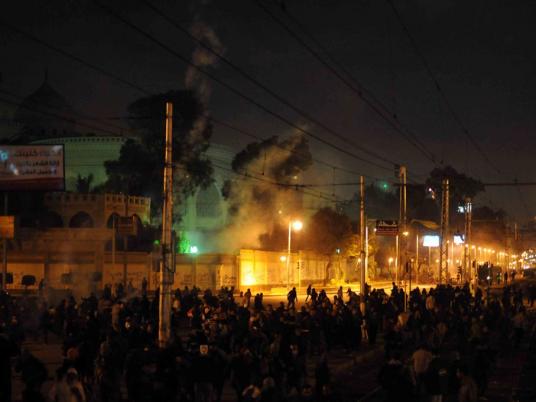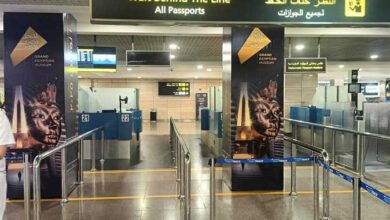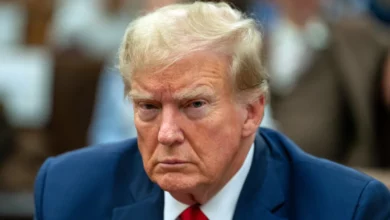
With a covered face and a rock in hand, one protester taking part in the ongoing clashes with the police at Qasr al-Nil Bridge knew the drill too well, after two years of periodic clashes.
As the few lines of protesters separating him from the police line started running in panic at the sound of a tear gas canister being deployed, he took a quick look at the police line and assured protesters around him that they were safe where they were, calmly asking them to stay put.
The clashes at Qasr al-Nil mirror even more violent scenes that have spread across the country since the commemoration of the second anniversary of the revolution.
An unprecedentedly widespread wave of violent protests, road blocking, attempted attacks on police stations and the ruling Freedom and Justice Party headquarters started on 25 January in more than a dozen governorates and is still unfolding.
The masked Qasr al-Nil protester, who refused to reveal his identity, was impatient with the peaceful path of the revolution that has yet to bear much fruit.
“We’ve been peaceful for two years now. How long will we keep being shot with live bullets and not responding?” he asked.
While he doesn’t encourage the revolutionaries to be violent, he said, protesters now will respond to the violence they face with equal force.
“Remember that picture that was put in the square at the start of the revolution, where protesters put a flower down the barrel of a gun? Well, we don’t do this anymore,” he declared. “Now, if they fire live bullets at us and people fall from our side, we will respond violently and make sure that people on their side fall too.”
Interrupted by a heavy round of tear gas and shotguns, the masked protester and his colleagues ran for cover. A policeman followed them into their hiding place, shooting at them.
One of them yelled in anger as he gasped for air.
“This is why being peaceful won’t work anymore. We won’t keep chanting peacefully until they kill us all. An eye for an eye, and the one who started this is the one to blame,” he said.
As they ran away with the sound of another shotgun, one assured them, “This one is from our side.”
The violent path
On Monday, as clashes broke out on the corniche when police intercepted a march heading from Sayeda Zeinab to the Shura Council, some protesters took to 6 October bridge and blocked it with burnt tires, an occurrence that was repeated numerous times during the past week.
As protesters nervously stopped cars from passing, they expressed a loss of belief in peaceful demonstration, feeling that their protests in the last two years went unheard largely because they weren’t disruptive enough.
“We want to show him [the president] that we can disrupt the country,” said one protester.
When bystanders argued that the people in the cars he was blocking were not the ones to blame, he responded, “and what have the people down there being killed now done?”
In the minds of some, the exchange is emblematic of the depth of these protesters’ anger, but also of its elusive outcome.
Scholar Amr Abdelrahman said the romanticized view of the revolution as a peaceful one from the beginning has always been a myth.
“The [Hosni] Mubarak regime has created armies of miserable and desperate people that no one can control and they are always the driving power of the revolution,” he said.
Abdelrahman said he thinks violence has always been “part of the recipe of the revolution,” saying that even during the idolized first 18 days, violence such as attacking police stations was part of the street movement.
After two years of disappointments, Abdelrahman said, crowds returned to the state they were in on the “Friday of Anger” on 28 January 2011. The rest of the peaceful revolutionary moment of two years back, meanwhile, is suspended.
“There is a complete rejection of institutions. No one trusts the government, the opposition, the judiciary or the police,” he said.
But two years on, the context is different and the intersection of violence with higher politics is more blurred.
When popular dissatisfaction reached this level on the day of anger in 2011, it was the beginning of the end for the Mubarak regime. However, Abdelrahman said, the crisis this time around is that there is no revolutionary movement in the street or certain alternative path to respond to this state.
“We are now in front of a large sector of people, angry and desperate, feeling completely alienated from the state,” said Abdelrahman.
Helpless state
In the last few days, all attempts to suppress the rebellious wave have ended up having the opposite effect.
Following Morsy’s announcement of an emergency state and a curfew in Port Said, Suez and Ismailia — which have witnessed the most violence in the last few days — thousands filled the streets during the hours of the 9 pm to 6 am curfew in defiance, chanting and raising signs mocking the president’s decision.
At Qasr al-Nil Bridge where police attacked protesters Monday, protesters ended up taking over two police vehicles and capturing one senior officer, later releasing him.
“There is a level of rebellion that the government is unable to deal with and I don’t think the military will be able to deal with it either,” Abdelrahman said.
Abdelrahman added that the president’s approach, consisting of condemnation and threats instead of acknowledging the crisis of legitimacy that these events represent, will not resolve the situation.
As a movement that incorporates a large sector of society, Abdelrahman said, labeling anyone who takes part in attacking police stations and other forms of violence as thugs instead of dealing with the problem is delusional.
“This necessitates a radical change in the state’s approach to justice. People have to feel that the state is serving them so that they have a vested interest in its buildings and refrain from attacking them,” he said.
Baffled opposition
Seemingly aiming to capitalize on the unrest that the violence is creating without taking responsibility for it, the National Salvation Front (NSF), the biggest opposition coalition, has taken a lukewarm position toward the events, neither openly condemning nor supporting them.
While it announced its rejection of violence, the front rejected an invitation for dialogue with Morsy and encouraged the continuation of the street movement in a statement that it issued Monday.
“The front relies first and foremost on the people and on the continuation of the peaceful mobilization in the current revolutionary wave that started with the second anniversary of our revolution,” the statement said.
Defending the NSF, Hussein Abdel Ghany, its spokesperson, blamed the government for the current crisis.
“The regime that talks about the violence isn’t addressing its role in closing all the paths for national consensus, and is leaving the people no way out other than the street, where they respond to live bullets and tear gas with rocks,” he said.
While he reiterated that the front’s unchanging position is to reject violence, he stopped short of condemning the current movement in the street.
“This is the third wave of the revolution, which aims to bring justice for the martyrs and demands the social equality that was never realized. We stand by our people and listen to their voice and their will to go to the street angry about their hijacked revolution,” he asserted.
Meanwhile, making use of the current wave, the NSF also repeated its political demands, including the annulment of the Constitution and early presidential elections. However, the unfolding events show that even the front has no control or leadership over the street movement, which is far more detached from politics, hence its articulation of demands around constitutions and elections.
“No one can contain this anger in the street and no one can direct it or capitalize on it,” Abdelrahman said.
Abdelrahman said that while the political players are occupied with deciding whether this violence should be condemned or embraced as a continuation of the revolution, they should be preoccupied with the significance of this turn.
“In my opinion, what is happening is the death certificate to the political path that started on 11 February 2011. This path ended on 25 January 2013,” he said.
Abdelrahman argues that the spread of violence across the country in the last few days marks the failure of the attempt that started on the day Mubarak stepped down, to bring back a regime very similar to the one that the revolution overthrew, only with different faces.
For him, the extent of the influence that these events will have on the path of the revolution remains to be seen.



